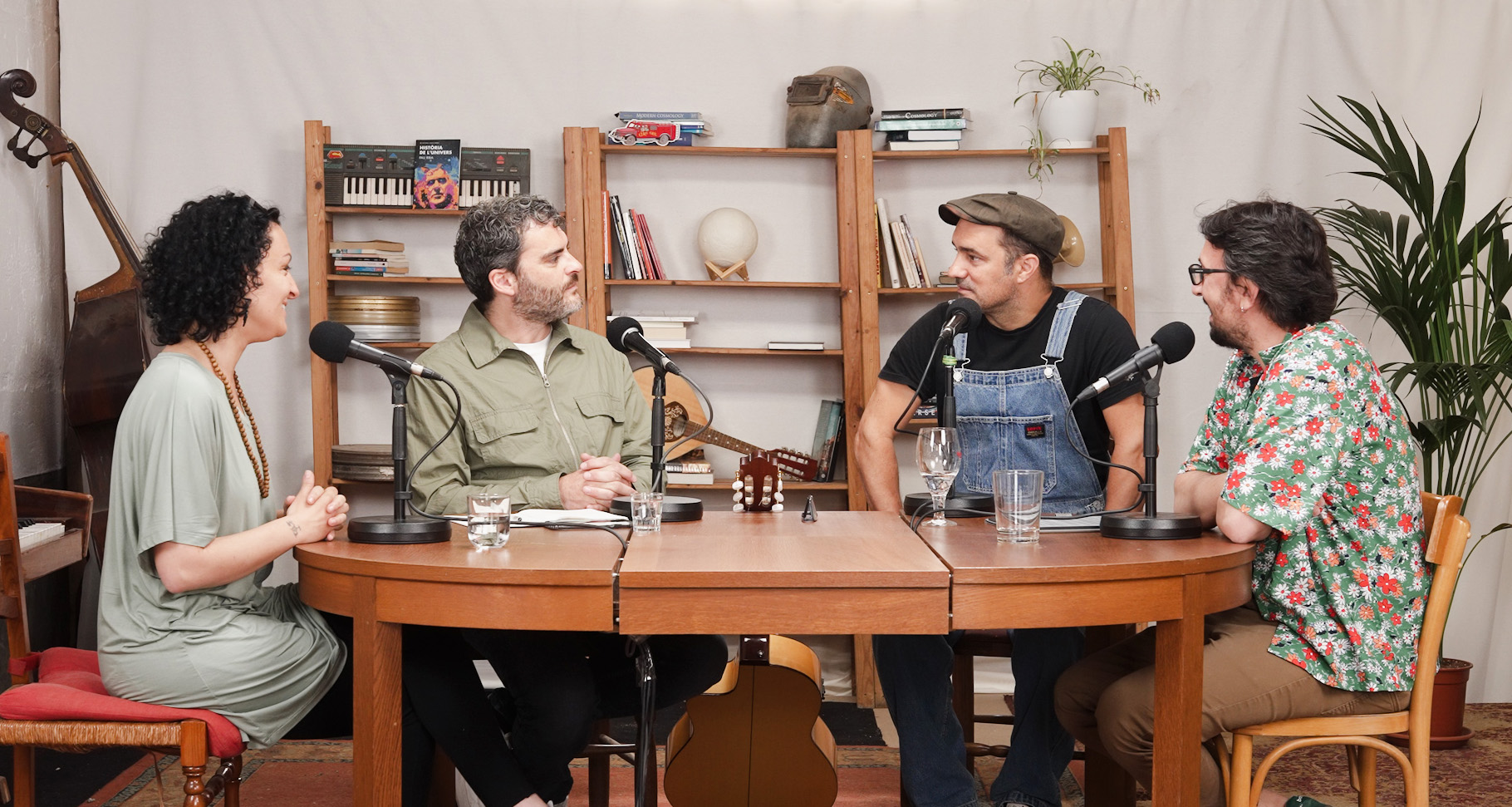First episode of ‘La veu còsmica’, a podcast combining art and science, premieres today

The podcast, available on YouTube, Spotify and Ivoox, features interviews with scientists to bring research in astrophysics and cosmology closer to the general public
Could there be life on Mars? What are gravitational waves? What are the alternative theories to the Big Bang? How can we measure the rate of expansion of the universe? These and many other questions give life to La veu còsmica, an audiovisual podcast in Catalan that combines science, music and poetry. The first episode premieres today.
Throughout 12 chapters of 25 minutes, Lluís Galbany, researcher from the Institute of Space Studies (IEEC — Institut d’Estudis Espacials de Catalunya) at the Institute of Space Sciences (ICE-CSIC), accompanied by the poet Esteve Plantada and the musician Joan Garriga, interviews experts on different topics in astrophysics and cosmology, such as space exploration, black holes, dark matter or supernovae. La veu còsmica can be found on YouTube, Spotify and Ivoox.
“The project was born from the desire to bring science closer to the public in an artistic way”, says Lluís Galbany. “This format seeks to attract the public so that they can understand first-hand general scientific concepts, learn more about the scientific research that is currently carried out, and be up-to-date about the latest advances in astrophysics and cosmology,” he adds.
The project is funded by the Catalan Foundation for Research and Innovation (FCRI), thanks to the Joan Oró 2022 Grants for the promotion of scientific culture in Catalonia, as well as the IEEC, the ICE-CSIC, the Institute of Cosmos Sciences of the University of Barcelona (ICCUB) and the Institute of High Energy Physics (IFAE). Scientists from all these research centres, as well as the University of the Balearic Islands (UIB), participate in this audiovisual podcast, explaining how research is done in their field and why.
Furthermore, the poet Esteve Plantada and the musician Joan Garriga use the topics discussed in the interviews as inspiration for their artistic creations, which liven up the format while translating technical concepts. First, Esteve Plantada presents the topic to be discussed in the programme and its historical context, travelling through time to explain how humanity discovered certain concepts. Later, after the interview conducted by Lluís Galbany, Joan Garriga and other invited artists end the programme with a musical composition.
List of episodes
- Mars and the possibility of extraterrestrial life, with Guillem Anglada (ICE-CSIC, IEEC)
- Asteroids, with Josep Maria Trigo (ICE-CSIC, IEEC)
- Star formation, with Gemma Busquet (ICCUB, IEEC)
- Black holes, with Mar Mezcua (ICE-CSIC, IEEC)
- Neutron stars and pulsars, with Nanda Rea (ICE-CSIC, IEEC)
- Gravitational waves, with Alicia M. Sintes (UIB, IEEC associated member)
- The Milky Way, with Teresa Antoja (ICCUB, IEEC)
- Large-scale structure of the Universe and dark matter, with Andreu Font (IFAE)
- Inflation and expansion of the Universe, with Diego Blas (IFAE)
- Cosmic Microwave Background and Hubble Tension, with Licia Verde (ICCUB)
- The Big Bang and alternative theories, with Jaume Garriga (ICCUB, IEEC)
- Supernovae, with Lluís Galbany (ICE-CSIC, IEEC)
Press release prepared in collaboration with the Institute of Space Sciences (ICE-CSIC).
Main Image
Caption: Nanda Rea, IEEC researcher at the ICE-CSIC, interviewed by Lluís Galbany, Esteve Plantada and Joan Garriga.
Credit: ICE-CSIC
Links
– IEEC
– ICE-CSIC
– ICCUB
– La veu còsmica on YouTube
– La veu còsmica on Spotify
– La veu còsmica on Ivoox
– La veu còsmica on Instagram
More information
The Institute of Space Studies of Catalonia (IEEC — Institut d’Estudis Espacials de Catalunya) promotes and coordinates space research and technology development in Catalonia for the benefit of society. IEEC fosters collaborations both locally and worldwide and is an efficient agent of knowledge, innovation and technology transfer. As a result of more than 25 years of high-quality research, done in collaboration with major international organisations, IEEC ranks among the best international research centers, focusing on areas such as: astrophysics, cosmology, planetary science, and Earth Observation. IEEC’s engineering division develops instrumentation for ground- and space-based projects, and has extensive experience in working with private or public organisations from the aerospace and other innovation sectors.
IEEC is a private non-profit foundation, governed by a Board of Trustees composed of Generalitat de Catalunya and four other institutions that each have a research unit, which together constitute the core of IEEC R&D activity: the Universitat de Barcelona (UB) with the research unit ICCUB — Institute of Cosmos Sciences; the Universitat Autònoma de Barcelona (UAB) with the research unit CERES — Center of Space Studies and Research; the Universitat Politècnica de Catalunya · BarcelonaTech (UPC) with the research unit CTE — Research Group in Space Sciences and Technologies; the Spanish Research Council (CSIC) with the research unit ICE — Institute of Space Sciences. The IEEC is a CERCA (Centres de Recerca de Catalunya) centre.
Contacts
IEEC Communication Office
Barcelona, Spain
E-mail: comunicacio@ieec.cat
Lead Researcher at IEEC
Barcelona, Spain
Lluís Galbany
Institute of Space Studies of Catalonia (IEEC)
Institute of Space Sciences (ICE-CSIC)
E-mail: lgalbany@ieec.cat
